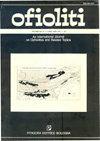伊朗南部切什梅赫-蛇绿地块岩石圈地幔辉石岩脉成因的岩石学约束
IF 1.3
4区 地球科学
Q2 GEOLOGY
引用次数: 2
摘要
Khajeh Jamali区(伊朗南部)的Cheshmeh Bid蛇绿地块以方辉橄榄岩-纯橄榄岩构造岩为主,局部被斜方辉石岩脉侵入。后者由主要的粗斜方辉石和次要的橄榄石、铬尖晶石、单斜辉石和角闪石组成。镁角闪岩和辉玄角闪岩的估计平衡温度揭示了晚期岩浆成因。Cheshmeh-Bid斜方辉石的特征是Al2O3、CaO、Na2O和TiO2丰度非常低,MgO和SiO2含量相对较高。它们显示出U型REE模式、选择性LILE富集和Pb和Sr正异常。寄主方辉橄榄岩是由流体辅助熔融产生的高难熔地幔残留物。野外观察和矿物组合表明,辉石岩是在中等压力下(P>1GPa),在相当寒冷的环境中沿裂缝熔融注入形成的方辉石岩和铬铁矿。根据大块岩石成分和矿物化学,我们推断Cheshmeh-Bid斜方辉石起源于俯冲上环境中富含硅、低钙的含水熔体的侵入和结晶,具有玻矿特征。辉石岩中发育的细粒新变晶岩域是对亚软质韧性变形和再结晶的响应,这很可能与Cheshmeh-Bid蛇绿岩地块的剥露有关。本文章由计算机程序翻译,如有差异,请以英文原文为准。
PETROLOGICAL CONSTRAINTS ON THE ORIGIN OF PYROXENITE DYKES IN THE LITHOSPHERIC MANTLE OF THE CHESHMEH-BID OPHIOLITIC MASSIF, SOUTHERN IRAN
The Cheshmeh-Bid ophiolitic massif in the Khajeh-Jamali district (Southern Iran) is dominated by harzburgite-dunite tectonites locally intruded by orthopyroxenite dikes. These latter are composed of dominant coarse orthopyroxene with minor olivine, Cr-spinel, clinopyroxene and amphibole. Estimated equilibrium temperatures for Mg-hornblende and edenitic amphibole reveal a late stage magmatic origin. The Cheshmeh-Bid orthopyroxenites are characterized by very low Al2O3, CaO, Na2O and TiO2 abundances coupled to relatively high MgO and SiO2 contents. They display U-shaped REE patterns, selective LILE enrichment and positive Pb and Sr anomalies. The host harzburgites are highly refractory mantle residues resulting from fluid-assisted melting. Field observations and mineral assemblages suggest that the pyroxenites formed by melt injection along fractures within rather cold ambient harzburgites and chromitites at moderate pressure (P > 1 GPa). Based on bulk-rock compositions and mineral chemistry, we infer that the Cheshmeh-Bid orthopyroxenites originated from the intrusion and crystallization of hydrous Si-rich, low-Ca melts with a boninite signature in a suprasubduction environment. Fine-grained neoblastic domains developed in the pyroxenites in response to subsolidus ductile deformation and recrystallization, which were most likely related to the exhumation of the Cheshmeh-Bid ophiolite massif.
求助全文
通过发布文献求助,成功后即可免费获取论文全文。
去求助
来源期刊

Ofioliti
地学-地质学
CiteScore
2.40
自引率
7.70%
发文量
1
期刊介绍:
Since 1976, Ofioliti provides an international forum for original contributions and reviews in the field of the geodynamics, petrology, geochemistry, biostratigraphy, stratigraphy, tectonics and paleogeography applied to ophiolitic terrains and modern oceanic lithosphere, including their sedimentary cover. Studies of topics such as geodynamics of the mantle, the evolution of orogens including ophiolites and paleoceanography are also welcome
 求助内容:
求助内容: 应助结果提醒方式:
应助结果提醒方式:


